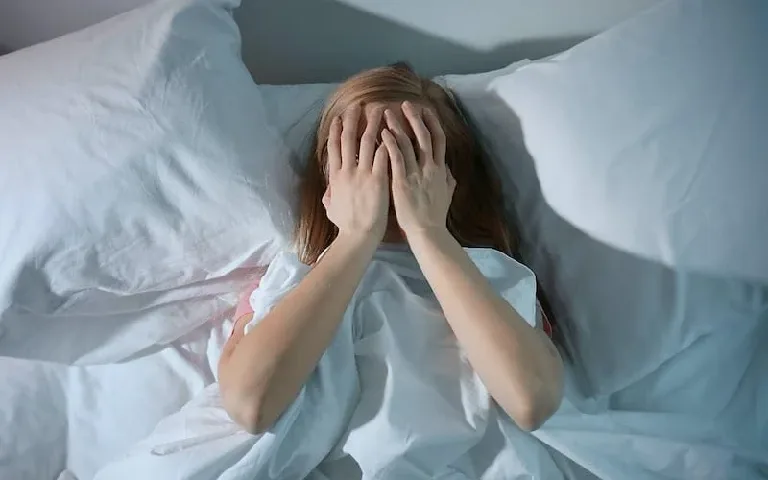Top 20 Reasons Why You Wake Up With Headaches

Top 20 Reasons Why You Wake Up With Headaches
Contents
- 1 Top 20 Reasons Why You Wake Up With Headaches
- 1.1 1. Dehydration – The Silent Culprit
- 1.2 2. Sleep Apnea – Disturbing Your Rest
- 1.3 3. Bruxism – Teeth Grinding
- 1.4 4. Stress and Anxiety – Affecting Your Sleep
- 1.5 5. Poor Sleep Environment – The Importance of Comfort
- 1.6 6. Caffeine Withdrawal – Breaking the Habit
- 1.7 7. Sinus Congestion – Blocked Airways
- 1.8 8. Neck and Shoulder Tension – Unwinding the Knots
- 1.9 9. Sleep Schedule Disruptions – Consistency is Key
- 1.10 10. Sleep Position – Optimal Alignment
- 1.11 11. Alcohol Consumption – The Hangover Effect
- 1.12 12. Medication Side Effects – Check the Labels
- 1.13 13. Low Blood Sugar – Breakfast Matters
- 1.14 14. Eye Strain – Screen Time Woes
- 1.15 15. Sleep Talking or Sleepwalking – Disturbing Your Rest
- 1.16 16. Sleep Allergies – Environmental Triggers
- 1.17 17. Migraine – The Morning Onset
- 1.18 18. Sleep Disorders – Restless Nights
- 1.19 19. Carbon Monoxide Exposure – Silent Danger
- 1.20 20. Unresolved Emotional Issues – Emotional Well-being Matters
- 2 Frequently Asked Questions (FAQs)
- 3 Conclusion
Top 20 Reasons Why You Wake Up With Headaches
1. Dehydration – The Silent Culprit
Dehydration is one of the most common culprits behind sleeping headaches. When you don’t drink enough water throughout the day, your body becomes dehydrated, leading to headaches in the morning. Make sure to stay hydrated by drinking plenty of water throughout the day, especially before going to bed.2. Sleep Apnea – Disturbing Your Rest
Sleep apnea can cause waking up with headaches due to interrupted breathing during sleep. In obstructive sleep apnea, the airway becomes blocked, leading to brief pauses in breathing and decreased oxygen levels. This triggers the brain to signal the blood vessels to dilate, causing headaches upon waking. The repeated cycles of oxygen deprivation and arousal from sleep can lead to chronic morning headaches. Treating sleep apnea with continuous positive airway pressure (CPAP) or other therapies can help improve breathing during sleep and alleviate headaches.3. Bruxism – Teeth Grinding
Do you wake up with headaches and jaw pain? Bruxism, or teeth grinding during sleep, could be the cause. The pressure on your jaw and head muscles can trigger morning headaches. Consider using a mouthguard to protect your teeth and alleviate the pain.4. Stress and Anxiety – Affecting Your Sleep
 Stress and anxiety can cause waking up with headaches due to their impact on the body’s nervous system. Persistent stress and anxiety can lead to muscle tension, including those in the head and neck, which can trigger headaches. Additionally, stress can disrupt sleep patterns, leading to poor-quality sleep and morning headaches. Managing stress through relaxation techniques, regular exercise, and seeking support can help reduce tension and anxiety-related headaches. Establishing a calming bedtime routine and ensuring a restful sleep environment can also promote good night’s sleep and alleviate sleeping headaches.
Stress and anxiety can cause waking up with headaches due to their impact on the body’s nervous system. Persistent stress and anxiety can lead to muscle tension, including those in the head and neck, which can trigger headaches. Additionally, stress can disrupt sleep patterns, leading to poor-quality sleep and morning headaches. Managing stress through relaxation techniques, regular exercise, and seeking support can help reduce tension and anxiety-related headaches. Establishing a calming bedtime routine and ensuring a restful sleep environment can also promote good night’s sleep and alleviate sleeping headaches.
5. Poor Sleep Environment – The Importance of Comfort
A poor sleep environment can trigger sleeping headaches by disrupting the body’s natural sleep patterns. Factors like excessive noise, uncomfortable bedding, improper room temperature, and bright lights can lead to difficulty falling and staying asleep. This lack of quality sleep can cause tension headaches, migraines, and increase sensitivity to pain. Creating a conducive sleep environment with minimal disturbances, soothing surroundings, and proper sleep hygiene can help alleviate sleeping headaches and promote restful sleep.6. Caffeine Withdrawal – Breaking the Habit
If you consume caffeine regularly but skip your morning cup, you may experience caffeine withdrawal headaches. When caffeine intake suddenly stops, the vessels dilate, triggering headaches. The body becomes dependent on caffeine, and without it, withdrawal symptoms like wake up with headaches, fatigue, and irritability occur. Gradually reducing caffeine intake can help prevent morning headaches and ease the transition to a lower caffeine level. Staying hydrated and getting adequate sleep also aid in managing withdrawal symptoms.7. Sinus Congestion – Blocked Airways
Sinus congestion can cause morning headaches due to the buildup of mucus in the sinus cavities during sleep. When these cavities become blocked, pressure increases, leading to headaches upon waking. The congestion may result from allergies, infections, or environmental irritants. As the body is in a reclined position during sleep, mucus can accumulate, exacerbating the problem upon awakening. Managing allergies, using saline nasal sprays, and sleeping with an elevated head can help alleviate sinus congestion and promote good night’s sleep.8. Neck and Shoulder Tension – Unwinding the Knots
 Tension in the neck and shoulder muscles can cause morning headaches. Poor sleeping positions, stress, or prolonged computer use can lead to muscle tightness in these areas. The tension can refer pain to the head, triggering wake up with headaches. Improving sleep posture, practicing relaxation techniques, and regular neck and shoulder exercises can help reduce tension. Additionally, using a supportive pillow and maintaining good ergonomics during daily activities can alleviate strain on these muscles, minimizing the occurrence of headaches.
Tension in the neck and shoulder muscles can cause morning headaches. Poor sleeping positions, stress, or prolonged computer use can lead to muscle tightness in these areas. The tension can refer pain to the head, triggering wake up with headaches. Improving sleep posture, practicing relaxation techniques, and regular neck and shoulder exercises can help reduce tension. Additionally, using a supportive pillow and maintaining good ergonomics during daily activities can alleviate strain on these muscles, minimizing the occurrence of headaches.
9. Sleep Schedule Disruptions – Consistency is Key
Sleep schedule disruptions can lead to morning headaches as they disturb the body’s natural circadian rhythm. Irregular sleep patterns, such as jet lag, shift work, or inconsistent bedtimes, can result in insufficient or fragmented sleep. This disruption can trigger headaches upon waking due to altered brain chemicals and reduced restorative sleep. Maintaining a consistent sleep schedule, avoiding excessive daytime naps, by taking best sleeping pills and creating a relaxing bedtime routine can help regulate the body’s internal clock and reduce the likelihood of sleeping headaches caused by sleep schedule disruptions.10. Sleep Position – Optimal Alignment
Sleeping in an improper position can strain your neck and head muscles, resulting in wake up with headaches. Sleeping on the stomach or with the head in an awkward angle can strain the neck and upper back muscles, leading to tension headaches. Similarly, sleeping on a very high or low pillow can cause neck misalignment. Opting for a supportive pillow and sleeping on the back or side can help maintain proper spinal alignment, reducing the risk of morning headaches. Adjusting sleep positions and using a comfortable pillow may promote good night’s sleep and alleviate headache occurrences.11. Alcohol Consumption – The Hangover Effect
Alcohol consumption can lead to sleeping headaches due to its dehydrating effects. Alcohol acts as a diuretic, causing increased urine production and fluid loss, which can result in dehydration. Dehydration can trigger morning headaches, including migraines and tension headaches. Additionally, alcohol can disrupt sleep patterns, leading to fragmented and poor-quality sleep. Combining these factors can contribute to waking up with headaches after drinking alcohol. Limiting alcohol intake, staying hydrated, and avoiding alcohol close to bedtime can help reduce the likelihood of sleeping headaches.12. Medication Side Effects – Check the Labels
Morning headaches can be caused by side effects of certain medications. Some drugs, such as blood pressure medications, antidepressants, and hormonal treatments, may lead to headaches as an adverse reaction. These medications can affect blood vessels, brain chemistry, or fluid balance, triggering headaches upon waking. If experiencing headaches while on medication, it’s essential to consult a healthcare professional. They can assess the medication’s potential side effects, adjust the dosage, or suggest alternative medications like Zopiclone 7.5mg to alleviate headaches and promote good night’s sleep.13. Low Blood Sugar – Breakfast Matters
 Skipping breakfast or having irregular eating habits can lead to low blood sugar, causing morning headaches. Low blood sugar (hypoglycemia) can cause sleeping headaches due to the brain’s increased sensitivity to glucose fluctuations during sleep. When blood sugar levels drop significantly, the brain’s blood vessels may constrict, leading to headaches. Maintaining a balanced diet with regular meals and monitoring blood sugar levels can help prevent low blood sugar-related headaches during sleep. If experiencing persistent sleep-related headaches, it’s essential to consult a healthcare professional for proper evaluation and management.
Skipping breakfast or having irregular eating habits can lead to low blood sugar, causing morning headaches. Low blood sugar (hypoglycemia) can cause sleeping headaches due to the brain’s increased sensitivity to glucose fluctuations during sleep. When blood sugar levels drop significantly, the brain’s blood vessels may constrict, leading to headaches. Maintaining a balanced diet with regular meals and monitoring blood sugar levels can help prevent low blood sugar-related headaches during sleep. If experiencing persistent sleep-related headaches, it’s essential to consult a healthcare professional for proper evaluation and management.
14. Eye Strain – Screen Time Woes
Excessive screen time can strain your eyes and cause sleeping headaches. Eye strain can lead to sleeping headaches as it causes the eye muscles to fatigue and tense up. Prolonged use of digital devices, reading in low light, or focusing on nearby objects for extended periods can contribute to eye strain. The strain can radiate to the head and neck, leading to headaches during sleep or upon waking. To prevent such headaches, take regular breaks during screen time, use proper lighting, and ensure an ergonomic setup. An eye check-up is also recommended to address any vision issues contributing to eye strain and headaches.15. Sleep Talking or Sleepwalking – Disturbing Your Rest
Sleep talking or sleepwalking can cause morning headaches due to the disrupted sleep patterns they create. These parasomnias can result in fragmented and poor-quality sleep, leading to headaches upon waking. Sleepwalking episodes, where the person may bump into objects or walls, can cause head injuries, triggering headaches. Similarly, sleep talking may lead to muscle tension and stress, contributing to headaches. Managing stress, creating a relaxing bedtime routine, and ensuring a safe sleep environment can help reduce the likelihood of morning headaches associated with sleep talking or sleepwalking.16. Sleep Allergies – Environmental Triggers
Sleep allergies can cause wake up with headaches due to the body’s immune response to allergens. Allergens like dust mites, pet dander, pollen, or mold can trigger inflammation in the nasal passages, sinuses, and airways. This inflammation can lead to congestion and increased pressure in the head, resulting in headaches upon waking. Reducing exposure to allergens by keeping the bedroom clean, using hypoallergenic bedding, and implementing air purifiers can help alleviate sleep allergies and reduce morning headaches. Consultation with an allergist may also be beneficial for proper diagnosis and management.17. Migraine – The Morning Onset
Migraines can occur in the morning, waking you up with intense headaches. Migraine attacks often involve a throbbing or pulsating pain, sensitivity to light and sound, and nausea. During sleep, the brain can remain in a hyperactive state, leading to continued wake up with headaches symptoms. Additionally, changes in sleep patterns, irregular sleep, or insufficient rest can trigger migraines. Maintaining a consistent sleep schedule, managing triggers, and seeking medical advice for migraine treatment can help reduce the frequency of waking up with headaches.18. Sleep Disorders – Restless Nights
 Sleep disorders can cause morning headaches due to the disruption of normal sleep patterns. Conditions like sleep apnea, insomnia, and restless legs syndrome can lead to poor-quality sleep, resulting in waking up with headaches. Sleep apnea, characterized by breathing pauses during sleep, can decrease oxygen levels, leading to headaches. Insomnia, which makes it difficult to fall or stay asleep, can cause sleep deprivation-related headaches. Restless legs syndrome may disrupt sleep and lead to tension headaches. Proper diagnosis and treatment of sleep disorders are crucial to alleviate headaches and improve overall sleep quality.
Sleep disorders can cause morning headaches due to the disruption of normal sleep patterns. Conditions like sleep apnea, insomnia, and restless legs syndrome can lead to poor-quality sleep, resulting in waking up with headaches. Sleep apnea, characterized by breathing pauses during sleep, can decrease oxygen levels, leading to headaches. Insomnia, which makes it difficult to fall or stay asleep, can cause sleep deprivation-related headaches. Restless legs syndrome may disrupt sleep and lead to tension headaches. Proper diagnosis and treatment of sleep disorders are crucial to alleviate headaches and improve overall sleep quality.
19. Carbon Monoxide Exposure – Silent Danger
Carbon monoxide exposure can cause sleeping headaches as it interferes with oxygen delivery to the brain. When carbon monoxide is inhaled, it binds to hemoglobin in the blood more readily than oxygen, reducing the amount of oxygen available for the brain and other organs. This lack of oxygen can lead to morning headaches, dizziness, and fatigue during sleep. Carbon monoxide is a silent and potentially deadly gas, so it’s vital to have functioning carbon monoxide detectors in living spaces and avoid exposure to prevent sleeping headaches and more severe health consequences.20. Unresolved Emotional Issues – Emotional Well-being Matters
Unresolved emotional issues can manifest as physical symptoms, including morning headaches. Consider speaking with a therapist to address these issues and promote better sleep.Frequently Asked Questions (FAQs)
Wake up with headaches are relatively common and can be caused by various factors, including dehydration, sleep disorders, stress, and poor sleep environment.
Yes, dehydration is a common cause of morning headaches. Make sure to drink enough water throughout the day to prevent this.
You can prevent sleeping headaches by staying hydrated, maintaining a consistent sleep schedule, managing stress, and addressing any underlying sleep disorders.
If you experience frequent and severe morning headaches that do not improve with lifestyle changes, it’s essential to seek medical attention to rule out any underlying health issues.
Yes, sleep apnea can lead to morning headaches due to interruptions in breathing during sleep, leading to oxygen deprivation.
Regular stretching exercises, relaxation techniques, and addressing neck and shoulder tension can help reduce morning tension headaches.
Conclusion
Wake up with headaches can be distressing, but by understanding the top 20 reasons behind this phenomenon, you can take proactive steps to alleviate the issue. Remember to stay hydrated, create a comfortable sleep environment, manage stress, and seek professional help for any unresolved sleep disorders and to get good night’s sleep. Prioritize your sleep and overall well-being to wake up refreshed and ready to take on the day, headache-free.

Hello, my name is Marcie C and I am a professional medical content writer based in the USA. With a passion for healthcare and a flair for writing, I specialize in creating engaging and informative content for the medical industry. Read more about me…





